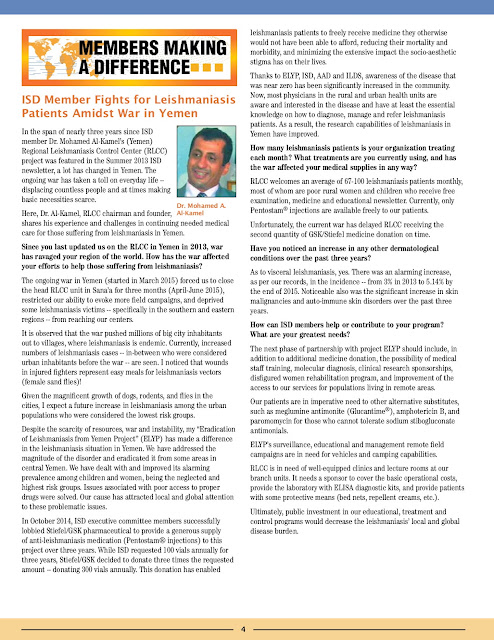ISD Connection
MEMBERS MAKING A DIFFERENCE
ISD Member Fights for Leishmaniasis Patients
Amidst War in Yemen
In the span of nearly three years since ISD member
Dr. Mohamed Al-Kamel’s (Yemen) Regional Leishmaniasis Control Center (RLCC) project
was featured in the Summer 2013 ISD newsletter, a lot has hanged in Yemen. The ongoing
war has taken a toll on everyday life -- displacing countless people and at
times making basic necessities scarce.
Here, Dr. Al-Kamel, RLCC chairman and founder, shares
his experience and challenges in continuing needed medical care for those
suffering from leishmaniasis in Yemen.
Since you last updated us on the RLCC in Yemen in
2013, war has ravaged your region of the world. How has the war affected your
efforts to help those suffering from leishmaniasis?
The ongoing war in Yemen (started in March 2015)
forced us to close the head RLCC unit in Sana’a for three months (April-June
2015), restricted our ability to evoke more field campaigns, and deprived some
leishmaniasis victims -- specifically in the southern and eastern regions --
from reaching our centers.
It is observed that the war pushed millions of
big city inhabitants out to villages, where leishmaniasis is endemic.
Currently, increased numbers of leishmaniasis cases -- in-between who were
considered urban inhabitants before the war -- are seen. I noticed that wounds in
injured fighters represent easy meals for leishmaniasis vectors (female sand
flies)!
Given the magnificent growth of dogs, rodents,
and flies in the cities, I expect a future increase in leishmaniasis among the
urban populations who were considered the lowest risk groups.
Despite the scarcity of resources, war and
instability, my “Eradication of Leishmaniasis from Yemen Project” (ELYP) has
made a difference in the leishmaniasis situation in Yemen. We have addressed
the magnitude of the disorder and eradicated it from some areas in central
Yemen. We have dealt with and improved its alarming prevalence among children
and women, being the neglected and highest risk groups. Issues associated with
poor access to proper drugs were solved. Our cause has attracted local and
global attention to these problematic issues.
In October 2014, ISD executive committee members
successfully lobbied Stiefel/GSK pharmaceutical to provide a generous supply of
anti-leishmaniasis medication (Pentostam® injections) to this project over
three years. While ISD requested 100 vials annually for three years,
Stiefel/GSK decided to donate three times the requested amount -- donating 300
vials annually. This donation has enabled leishmaniasis patients to freely
receive medicine they otherwise would not have been able to afford, reducing
their mortality and morbidity, and minimizing the extensive impact the
socio-aesthetic stigma has on their lives.
Thanks to ELYP, ISD, AAD and ILDS, awareness of
the disease that was near zero has been significantly increased in the
community.
Now, most physicians in the rural and urban
health units are aware and interested in the disease and have at least the
essential knowledge on how to diagnose, manage and refer leishmaniasis patients.
As a result, the research capabilities of leishmaniasis in
Yemen have improved.
How many leishmaniasis patients is your
organization treating each month? What treatments are you currently using, and
has the war affected your medical supplies in any way?
RLCC welcomes an average of 67-100 leishmaniasis
patients monthly, most of whom are poor rural women and children who receive
free examination, medicine and educational newsletter. Currently, only Pentostam®
injections are available freely to
our patients.
Unfortunately, the current war has delayed RLCC
receiving the second quantity of GSK/Stiefel medicine donation on time.
Have you noticed an increase in any other
dermatological conditions over the past three years?
As to visceral leishmaniasis, yes. There was an
alarming increase, as per our records, in the incidence -- from 3% in 2013 to
5.14% by the end of 2015. Noticeable also was the significant increase in skin malignancies
and auto-immune skin disorders over the past three years.
How can ISD members help or contribute to your
program?
What are your greatest needs?
The next phase of partnership with project ELYP
should include, in addition to additional medicine donation, the possibility of
medical staff training, molecular diagnosis, clinical research sponsorships, disfigured
women rehabilitation program, and improvement of the access to our services for
populations living in remote areas.
Our patients are in imperative need to other
alternative substitutes, such as meglumine antimonite (Glucantime®),
amphotericin B, and paromomycin for those who cannot tolerate sodium
stibogluconate antimonials.
ELYP’s surveillance, educational and management
remote field campaigns are in need for vehicles and camping capabilities.
RLCC is in need of well-equipped clinics and
lecture rooms at our branch units. It needs a sponsor to cover the basic
operational costs, provide the laboratory with ELISA diagnostic kits, and provide
patients with some protective means (bed nets, repellent creams, etc.).
Ultimately, public investment in our educational,
treatment and control programs would decrease the leishmaniasis’ local and
global disease burden.
 |
| Dr. Mohamed A.Al-Kamel |
النشرة الرسمية للجمعية الدولية
للأمراض الجلدية: في خضم الحرب في اليمن؛ الدكتور محمد احمد الكامل - عضو
الجمعية الدولية للأمراض الجلدية يخوض حربا لمساعدة مرضى الليشمانيا في اليمن.



